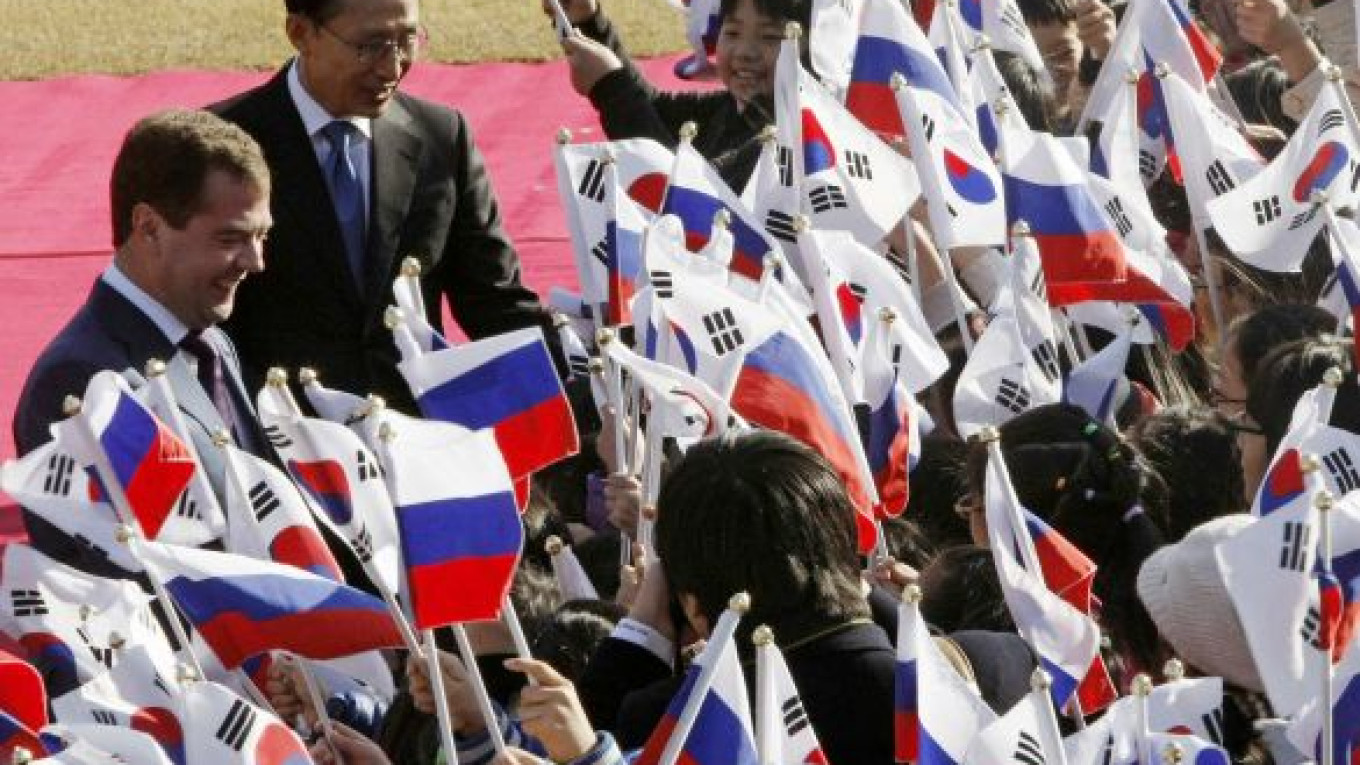Gazprom's sales to South Korea should pull even with supplies to major European buyers like France by 2017 as the Russian gas export monopoly turns its attention toward burgeoning Asian markets, Gazprom chief Alexei Miller said Wednesday.
“Europe will undoubtedly remain a priority market for Gazprom. It was the No. 1 market and will remain the No. 1 market for years,” he said. “But the volume of Russian gas supplies to the Asian market may reach the volume of gas supplies to Europe in a very short period of time."
Miller was accompanying President Dmitry Medvedev, who traveled to Seoul for talks with his South Korean counterpart, Lee Myung-bak, and a meeting Thursday of the Group of 20 largest economies.
Gazprom could supply at least 10 billion cubic meters of gas annually starting in 2017 as South Korea's demand for the fuel will grow by at least 15 percent in the next seven years, Miller said in Seoul after a meeting with executives from Kogas, the country's largest gas company. The companies will decide later on whether the supplies will be by pipeline or as liquefied natural gas, he said.
Gazprom's first LNG plant, part of the Sakhalin-2 project, began shipping compressed gas in March 2009, including to South Korea. The company has sought to expand in Asia as demand for its pipeline gas in Europe is squeezed by cheaper spot prices for LNG and nontraditional sources like shale gas.
Russia and South Korea will start talks on terms of the supply deal next month, but Gazprom plans to supply the gas under the take-or-pay principle it uses in Europe, Miller said.
The contracts mean that customers must pay for a fixed volume of gas, even if they do not ultimately require all of the fuel. Some European customers have sought more flexible supplies since demand for gas plummeted during the economic downturn last year.
Pricing will also be "the same as in all our other contracts," Miller said. "Everything will be tied to the Japanese oil products basket,” he said.
South Korea's gas industry relies heavily on LNG, making more diversified supplies — including from Russia — an interesting prospect, said Valery Nesterov, an oil and gas analyst at Troika Dialog.
“The country is heavy populated and demand for gas is high,” he told The Moscow Times.
Consumption in South Korea more than doubled in the past decade to reach 33.8 bcm in 2009, from 16.8 bcm in 1999, Nesterov said. Russia will have to compete with Qatar, Malaysia and Australia for a share of the Korean gas market, he said.
Gazprom's biggest clients in Europe are Germany and Turkey, with supplies last year of 33.5 bcm and 20 bcm, respectively, according to the company. It also supplied 19 bcm to Italy and 10 bcm to France, while sales to Britain and Poland were 9.7 bcm and 9 bcm.
Demand for gas in the Pacific region is already higher than in Europe, Miller said, and the Asian gas market will likely be as important for Gazprom as Europe soon.
Gazprom started supplies of LNG to South Korea last year under a contract signed in 2003. Since then, the company has shipped 2.9 million metric tons of LNG — equivalent to about 4 bcm of pipeline gas, the company said in a statement.
Separately, Medvedev told a South Korea-Russia business forum that more investors should consider doing business in Russia.
Trade between the countries was worth $11 billion in the first half of this year, back to pre-crisis levels but below Russia's trade with the United States, Japan and China, he said.
“Russia is interested in Korean investors. They not only create jobs but — what I think is most important today — they bring modern technologies and introduce modern production practices,” Medvedev told the business forum, according to a transcript on the Kremlin web site.
Korean companies could contribute to the modernization of Russia's economy, with energy efficiency, medicine, space, computer and nuclear technologies being priority areas for cooperation, he said.
Among the business agreements reached in Seoul was a memorandum of intention between Mechel, a Russian coal and steel producer, and Korean steelmaker Posco. The companies may cooperate on steelmaking, mining and logistics in Russia, South Korea and third countries, Mechel said in a statement.
The companies will sign a memorandum Thursday on a joint construction of a steel mill in Siberia, Bloomberg reported, citing South Korean media.
A Message from The Moscow Times:
Dear readers,
We are facing unprecedented challenges. Russia's Prosecutor General's Office has designated The Moscow Times as an "undesirable" organization, criminalizing our work and putting our staff at risk of prosecution. This follows our earlier unjust labeling as a "foreign agent."
These actions are direct attempts to silence independent journalism in Russia. The authorities claim our work "discredits the decisions of the Russian leadership." We see things differently: we strive to provide accurate, unbiased reporting on Russia.
We, the journalists of The Moscow Times, refuse to be silenced. But to continue our work, we need your help.
Your support, no matter how small, makes a world of difference. If you can, please support us monthly starting from just $2. It's quick to set up, and every contribution makes a significant impact.
By supporting The Moscow Times, you're defending open, independent journalism in the face of repression. Thank you for standing with us.
Remind me later.


